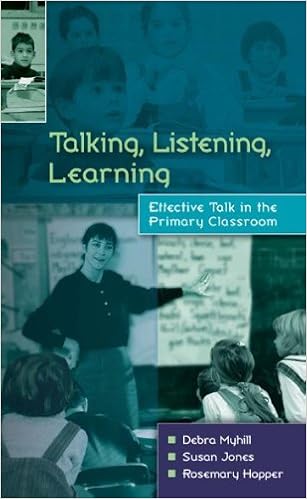
By Debra Myhill
ISBN-10: 0335217443
ISBN-13: 9780335217441
ISBN-10: 0335217451
ISBN-13: 9780335217458
ISBN-10: 0335226620
ISBN-13: 9780335226627
This publication seems to be at a topic that's on the center of each school room – the position that speak performs in children’s studying. Drawing on a considerable study base, the publication presents valuable feedback to facilitate profitable speak among academics and kids to enhance studying and lift criteria. via analysing the debate that is going on in basic institution school rooms, the e-book examines the method of speak and studying intimately and indicates how lecturers’ questions, directions and statements can aid and expand children’s studying. It highlights the important effect of instructor speak on constructing children’s studying and appears at foreign views within the box, together with the paintings of Shirley Brice Heath, Douglas Barnes, Gordon Wells, Neil Mercer and Robin Alexander. This leading edge publication presents principles, ideas, and useful feedback for making lecture room speak powerful. it truly is key studying for scholar and certified academics who're attracted to bettering studying via producing greater degrees of participation and interactive speak of their study rooms.
Read or Download Talking, Listening and Learning PDF
Best certification & development books
This ebook demonstrates the complementarity of academic and coaching methods to constructing intercultural competence as represented by means of those that paintings in advertisement education and those that paintings in additional and better schooling. It does so through offering chapters of research and chapters describing classes within the sectors.
Distilling the learn literature and translating the medical procedure into language proper to a school or college instructor, this e-book introduces seven normal ideas of the way scholars study. The authors have drawn on learn from a breadth of views (cognitive, developmental, and social psychology; academic examine; anthropology; demographics; organizational habit) to spot a suite of key ideas underlying studying, from how powerful association complements retrieval and use of data to what affects motivation.
Download e-book for iPad: Totally Positive Teaching: A Five-Stage Approach to by Joseph Ciaccio
Self-discipline difficulties, constrained assets, crowded study rooms. academics face many concerns on a daily basis which can put on down their love of schooling. How can they remain centred and energized day in and trip? In completely optimistic instructing, Joseph Ciaccio stocks an method that remodeled him from a burned-out veteran instructor suffering joylessly via every day to a pro who has enjoyable along with his scholars, guiding them to luck whereas having fun with the instructing procedure.
Mentoring-coaching : a guide for education professionals - download pdf or read online
This publication explores the rules in the back of profitable mentoring-coaching in schooling. in addition to highlighting the various advantages of mentoring-coaching, it addresses hugely functional concerns similar to: Can an individual discover ways to be a mentor-coach? What behaviour counts as mentoring-coaching? How do i do know what to do, in what order and the way?
- Difficoltà in matematica: Osservare, interpretare, intervenire (Convergenze)
- Inspired English Teaching: A Practical Guide for Teachers
- Career Assessment: Qualitative Approaches
- Teacher Professional Development in Changing Conditions
Extra resources for Talking, Listening and Learning
Sample text
She had developed an interaction pattern which became ‘a collaborative endeavour in which meanings are negotiated and some common knowledge is mobilized’ (Mercer 2000: 6). Teachers’ questions Whole class teaching draws heavily on the teacher’s skill in questioning, as questioning remains the most common strategy for eliciting responses from children during a whole class teaching episode. Questioning in school is a very particular kind of questioning, however. Unlike most social contexts where you ask questions in order to establish something you don’t know, teachers predominantly ask 18 TALKING, LISTENING, LEARNING questions they know the answers to – and children know that there is usually a right answer to a teacher’s question.
Sometimes this disconnection occurs because the teacher, albeit unwittingly, is keeping too tight a control on the direction of the learning and not giving sufficient opportunity for children to draw on their prior knowledge to make sense of their learning. Kirby analyses the discourse of teacher–pupil interactions whilst reading a storybook together, and found that the talk provided ‘limited opportunities for children to connect prior knowledge to the story text’ (1996: 14). This contrasts with the teacher referred to earlier in the Hughes and Westgate study who used children’s prior knowledge as her starting-point.
Whilst this may have made teaching more purposeful, it may also have fostered greater use of closed or factual questioning. Similarly, where teachers lack confidence in the subject knowledge underpinning a given topic, they may adopt a questioning style that allows them to retain control and avoid opening up issues or questions which they feel unable to answer. Watts et al. (1997: 1030) observed this in primary science lessons, where some of the teachers ‘carefully formulate their planning, organization, assessment and materials and more tightly manage and control learning situations to minimize “exposure” of their own limited expertise’.
Talking, Listening and Learning by Debra Myhill
by John
4.2



